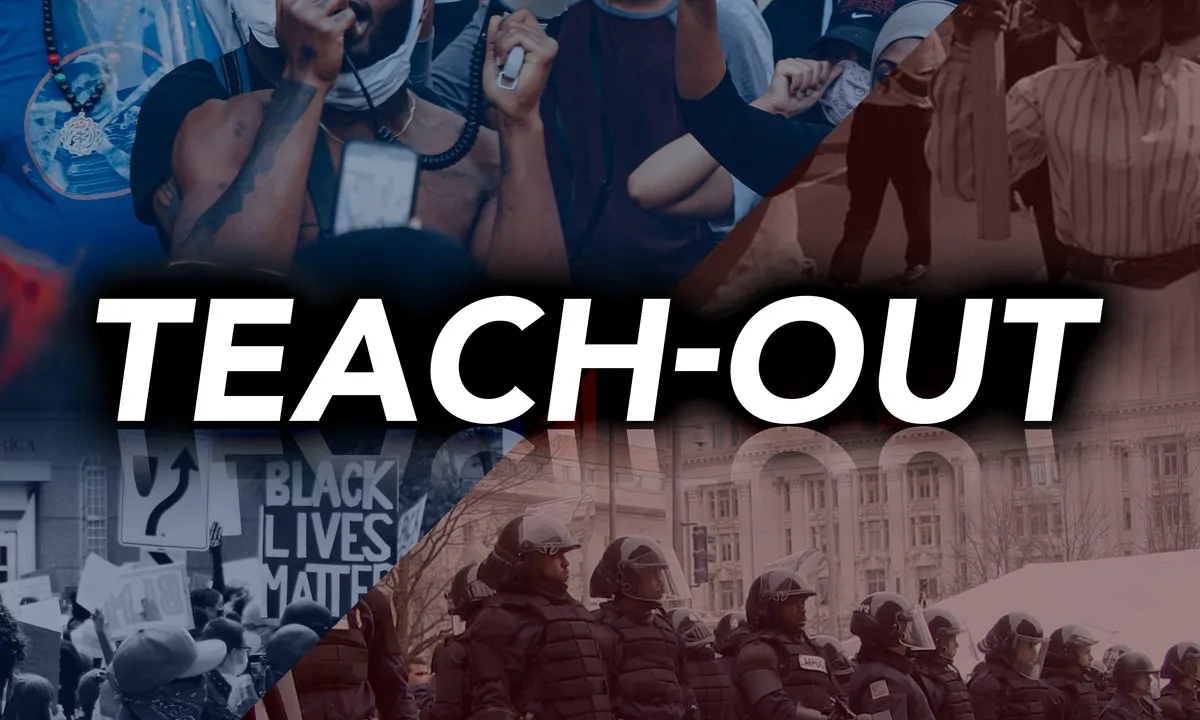
Police Brutality in America Teach-Out 
This Teach-Out explores the history of police brutality in America, the laws and policies that prevent accountability, and the demands of protesters. It provides the knowledge and tools to fight for change and reinvestment in communities rather than policing and prisons. Join millions of Americans and people around the world in the effort to end systemic racism and abuse of power. ▼
ADVERTISEMENT
Course Feature
![]() Cost:
Cost:
Free
![]() Provider:
Provider:
Coursera
![]() Certificate:
Certificate:
No Information
![]() Language:
Language:
English
![]() Start Date:
Start Date:
6th Jul, 2020
Course Overview
❗The content presented here is sourced directly from Coursera platform. For comprehensive course details, including enrollment information, simply click on the 'Go to class' link on our website.
Updated in [March 06th, 2023]
1. History of Police Violence in America: Learners can gain an understanding of the history of police violence in America, including the systemic racism and abuse of power that has been present for centuries. They can explore the laws and policies that have enabled police brutality and the efforts of activists to fight for change.
2. Understanding the Demands of Protesters: Learners can gain an understanding of the demands of protesters, including the call to #DefundThePolice and reinvest in communities rather than policing and prisons. They can explore the implications of these demands and how they can be implemented.
3. Knowledge and Tools to Fight for Change: Learners can gain the knowledge and tools to fight for change locally. They can explore the strategies and tactics that can be used to create meaningful and lasting change in their communities. They can also learn how to use their voices to advocate for justice and equality.
[Applications]
The application of this course could include taking action to support the Black Lives Matter movement, such as attending protests, signing petitions, and donating to organizations that are fighting for racial justice. Additionally, individuals could use the knowledge gained from this course to advocate for policy changes in their local communities, such as defunding the police and reinvesting in communities. Finally, individuals could use the information from this course to educate others about the history of police brutality in America and the current efforts to end it.
[Career Paths]
1. Civil Rights Lawyer: Civil rights lawyers specialize in protecting the rights of individuals and groups who have been discriminated against or otherwise treated unfairly. They work to ensure that laws are applied fairly and that individuals are not denied their rights. Civil rights lawyers are often involved in cases involving police brutality, and they are in high demand as the public calls for greater accountability and justice.
2. Community Organizer: Community organizers work to bring people together to create positive change in their communities. They often focus on issues such as police brutality, racial justice, and economic inequality. Community organizers are essential in helping to create and sustain movements for social change.
3. Policy Analyst: Policy analysts are responsible for researching and analyzing public policies and their effects on society. They often work with government agencies, non-profits, and other organizations to develop and implement policies that address issues such as police brutality and racial injustice.
4. Activist: Activists are individuals who are passionate about a cause and work to bring about social change. They often use a variety of tactics, such as protests, petitions, and social media campaigns, to raise awareness and push for change. Activists are essential in the fight against police brutality and racial injustice.
[Education Paths]
1. Bachelor's Degree in Criminal Justice: A Bachelor's Degree in Criminal Justice provides students with a comprehensive understanding of the criminal justice system, including the history, structure, and operations of the police, courts, and corrections. Students will learn about the legal and ethical issues surrounding police brutality, as well as the social and economic factors that contribute to it. Additionally, students will gain an understanding of the current trends in criminal justice reform, such as the use of body cameras, de-escalation training, and community policing.
2. Master's Degree in Social Justice: A Master's Degree in Social Justice provides students with an in-depth understanding of the social, economic, and political forces that shape the criminal justice system. Students will learn about the history of racism and oppression in the United States, and how these forces have contributed to the current state of police brutality. Additionally, students will gain an understanding of the current movements for criminal justice reform, such as the Black Lives Matter movement, and the strategies and tactics used to fight for change.
3. Doctorate in Law: A Doctorate in Law provides students with an advanced understanding of the legal framework surrounding police brutality and criminal justice reform. Students will learn about the legal precedents and case law that have shaped the current state of police brutality, as well as the laws and regulations that govern police conduct. Additionally, students will gain an understanding of the current trends in criminal justice reform, such as the use of body cameras, de-escalation training, and community policing.
4. Master's Degree in Public Policy: A Master's Degree in Public Policy provides students with an understanding of the policies and regulations that govern police conduct. Students will learn about the history of police brutality in the United States, and the laws and regulations that have been enacted to address it. Additionally, students will gain an understanding of the current trends in criminal justice reform, such as the use of body cameras, de-escalation training, and community policing.
Course Syllabus
Police Brutality in America Teach-Out
The tragic deaths of George Floyd, Breonna Taylor, and Ahmaud Arbery have sparked a wave of renewed protests against police brutality across the United States. These nationwide uprisings have transformed into an intense interest from the public around understanding systemic racism and abuse of power. Millions of Americans and people around the world are watching incidents of police violence and excessive force captured on video and are looking to learn about the inequalities at the root of these incidents. While the calls of Black Lives Matter protesters to #DefundThePolice are being heard for the first time by many Americans, they are part of a longstanding effort by communities and activists to reinvest in communities rather than policing and prisons. In this Teach-Out, you will learn about the history of police violence in America, become aware of laws and policies that prevent accountability, understand the demands of protesters, and gain the knowledge and tools to fight for change locally.Course Provider

Provider Coursera's Stats at AZClass
This book examines the history of police brutality in the United States, the laws and policies that prevent accountability, and the demands of protesters. It provides the knowledge and tools to fight for change and reinvests in communities rather than police and prisons. Join millions of Americans and people around the world in working to end systemic racism and abuse of power. Learners can learn about the history of police violence in the United States, including centuries of systemic racism and abuse of power. They can explore the laws and policies that led to police brutality and the efforts of activists to fight for change.
Discussion and Reviews
0.0 (Based on 0 reviews)
Explore Similar Online Courses

Alternative Approaches to Valuation and Investment

Create Your First Chatbot with Rasa and Python

Python for Informatics: Exploring Information

Social Network Analysis

Introduction to Systematic Review and Meta-Analysis

The Analytics Edge

DCO042 - Python For Informatics

Causal Diagrams: Draw Your Assumptions Before Your Conclusions

Whole genome sequencing of bacterial genomes - tools and applications

Human Rights for Open Societies

International Womens Health and Human Rights


Start your review of Police Brutality in America Teach-Out